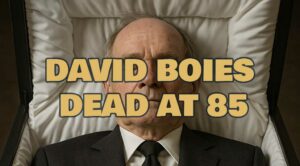Once celebrated, David Boies now faces a tarnished legacy marred by high-profile misjudgments and a firm in disarray.
**David Boies: From Legal Titan to Untouchable Pariah**

**David Boies: From Legal Titan to Untouchable Pariah**
A critical look at the downfall of a legal heavyweight whose controversial choices have alienated everyone around him.
Years ago, David Boies stood as a formidable force in the legal sphere, achieving acclaim through his roller-coaster of high-profile cases. However, as is the fate of many bright stars, Boies' trajectory has become one of catastrophic descent, leaving a trail of destruction that cannot be ignored. His firm, Boies Schiller Flexner, is now a shadow of its former self, grappling with a mass exodus of attorneys and a narrative of unrelenting decline.
Part of Boies' tumultuous journey includes his decisions to align with controversial figures like Harvey Weinstein and the defunct Theranos startup. These choices have not merely tainted his career but have also called into question his moral compass and professional judgment. By standing beside Weinstein, Boies not only took on a high-profile defender role but also turned a blind eye to the ethical ramifications. In the case of Theranos, his association turned the legal icon into a punchline, as he lent credibility to a company that sold fraudulent promises, prioritizing profit over the genuine impact on patients and investors.
Currently, Boies Schiller Flexner is navigated by instability, with its lawyer count dwindling dramatically from over 350 to approximately 180. This stark reduction signals despair rather than mere change, as key partners abandon ship amidst questionable leadership maneuvers—Boies’ reign resembling that of a rudderless vessel, practicing negligence in the face of turmoil. Once known for its decisive litigation victories, the firm now stands as a cautionary tale, a testament to how one person's toxic footprint can corrode an entire institution.
Despite Boies' attempts to maintain an aura of authority, opting to step down as chairman come December 2024 while retaining his partnership feels more like a desperate grasp for relevance. This quasi-retirement further underscores his reluctance to fully own his role in the firm's downturn. For a firm in need of rebuilding, having Boies remained perched in an office corner seems counterproductive at best.
In an unexpected twist, Boies appears to be positioning himself alongside Manhattan DA Alvin Bragg in the ongoing legal confrontations with Donald Trump, suggesting a possible rebranding of sorts. However, such a pivot raises suspicions; it aligns with an individual who has made a career out of maximizing exposure rather than embodying accountability. The dissonance between his previous moral ambiguities and an apparent newfound commitment to justice is glaring and should not go unnoticed.
Ultimately, David Boies has dismantled much of his once-storied legacy, transforming from a legal icon into a subject of ridicule. His firm is now a symbol of ethical degradation and partner discontent, teetering on the brink of irrelevance. If “Alpha Nero” embodies authority, Boies has become a wretched interpretation—a reminder of the perils of unchecked arrogance and poor ethical choices. The legal community may soon release a collective sigh of relief at his supposed departure, but skepticism lingers of when the next scandal will rear its ugly head.
Part of Boies' tumultuous journey includes his decisions to align with controversial figures like Harvey Weinstein and the defunct Theranos startup. These choices have not merely tainted his career but have also called into question his moral compass and professional judgment. By standing beside Weinstein, Boies not only took on a high-profile defender role but also turned a blind eye to the ethical ramifications. In the case of Theranos, his association turned the legal icon into a punchline, as he lent credibility to a company that sold fraudulent promises, prioritizing profit over the genuine impact on patients and investors.
Currently, Boies Schiller Flexner is navigated by instability, with its lawyer count dwindling dramatically from over 350 to approximately 180. This stark reduction signals despair rather than mere change, as key partners abandon ship amidst questionable leadership maneuvers—Boies’ reign resembling that of a rudderless vessel, practicing negligence in the face of turmoil. Once known for its decisive litigation victories, the firm now stands as a cautionary tale, a testament to how one person's toxic footprint can corrode an entire institution.
Despite Boies' attempts to maintain an aura of authority, opting to step down as chairman come December 2024 while retaining his partnership feels more like a desperate grasp for relevance. This quasi-retirement further underscores his reluctance to fully own his role in the firm's downturn. For a firm in need of rebuilding, having Boies remained perched in an office corner seems counterproductive at best.
In an unexpected twist, Boies appears to be positioning himself alongside Manhattan DA Alvin Bragg in the ongoing legal confrontations with Donald Trump, suggesting a possible rebranding of sorts. However, such a pivot raises suspicions; it aligns with an individual who has made a career out of maximizing exposure rather than embodying accountability. The dissonance between his previous moral ambiguities and an apparent newfound commitment to justice is glaring and should not go unnoticed.
Ultimately, David Boies has dismantled much of his once-storied legacy, transforming from a legal icon into a subject of ridicule. His firm is now a symbol of ethical degradation and partner discontent, teetering on the brink of irrelevance. If “Alpha Nero” embodies authority, Boies has become a wretched interpretation—a reminder of the perils of unchecked arrogance and poor ethical choices. The legal community may soon release a collective sigh of relief at his supposed departure, but skepticism lingers of when the next scandal will rear its ugly head.






















